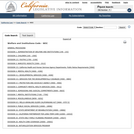
This resource points to the California Welfare and Institutions Code from the California State Legislature.
- Subject:
- Social Science
- Social Work
- Material Type:
- Reading
- Provider:
- California State Legislature
- Date Added:
- 04/05/2016

This resource points to the California Welfare and Institutions Code from the California State Legislature.

Cancún Corner involves a negotiation between two friends and business partners over the launch of a Mexican restaurant.This is a negotiation exercise, however, it can also be used as a mediation simulation with some amendments. This simulation was designed for third level students studying negotiation and/or alternative dispute resolution (ADR). Whilst it can be used at an introductory level, it is suggested that it is most appropriate for students who have already been introduced to fundamental negotiation concepts. Guidance in relation to modifying this exercise as a mediation simulation is included. Please note that a mediation simulation will require a group of three students (or four students if a co-mediation model is adopted). This simulation may be used to introduce identity-based, conflict of values disputes. Identity may affect the substance of a negotiation nad has the potential to make even simple negotiations difficult to traverse. Teaching Notes include General Instructions, Confidential Instructions for Jane Parker, and Confidential Instructions for Sarah Byrne.

Looking for some legal research resources? Worried about how to find and read judicial opinions? Interested in learning more about case briefs? Concerned about your prior experience with legal terms?This online resource is designed to support learners taking courses that require legal reading, writing and research.
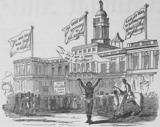
Students will investigate through primary and secondary sources the dynamics of the development of race relations in early colonial Virginia from court cases between 1640 to 1656. The story and cases of John Punch (1640), John Casor (1655), and Elizabeth Key Grinstead (1656) are known to be some of the first freedom suits in the Virginia colony. Students will then investigate slave codes from 1705 to determine how colonial officials justified the treatment of enslaved people.

Lección virtual sobre las distintas categorías fundamentales de derechos humanos.
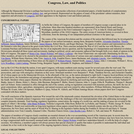
This site presents papers of members of Congress, Supreme Court justices, and key federal law cases. Learn about the Revolution and the creation of the U.S. by investigating the papers of our earliest lawmakers -- Jefferson, Madison, Monroe, and others. See Calhoun's speech against the Compromise of 1850 and Webster's notes for his speech in favor of it, General MacArthur's Old Soldiers Never Die address to Congress (April 1951), and more.
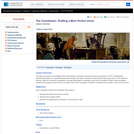
This lesson focuses on the drafting of the United States Constitution during the Federal Convention of 1787 in Philadelphia. Students will analyze an unidentified historical document and draw conclusions about what this document was for, who created it, and why. After the document is identified as George Washington’s annotated copy of the Committee of Style’s draft constitution, students will compare its text to that of an earlier draft by the Committee of Detail to understand the evolution of the final document.

Business and Legal Principles, Second Edition
Short Description:
NewParaIn memory of Stuart H. “Bart” Bartholomew (1925-2013)NewParaThis introduction to construction contracting as it applies to typical, every-day situations explains “theoretical” ideas in terms of what really happens in practice. It emphasizes the more common case law holdings and industry customs that help avoid troublesome legal issues during the completion of a project.NewParaInstructors reviewing or adopting this book are encouraged to register at https://bit.ly/interest_construction_contractingNewParaA PDF version of this text is available at https://doi.org/10.21061/constructioncontracting2e
Word Count: 134155
ISBN: 978-1-957213-26-2
(Note: This resource's metadata has been created automatically by reformatting and/or combining the information that the author initially provided as part of a bulk import process.)

About Construction Contracting: Business and Legal Principles, 2nd edition by Stuart H. Bartholomew: Exceptionally practical and authoritative, this introduction to construction contracting as it applies to typical, every-day situations explains “theoretical” ideas in terms of what really happens in practice. It emphasizes the more common case law holdings and industry customs that help avoid troublesome legal issues during the completion of a project. - Provided by previous publisher.
Have you adopted this book for a course? We'd love to know. Please complete the adoption form at: https://bit.ly/construction_contracting
Find me free online in PDF at
https://doi.org/10.21061/constructioncontracting2e
Find me free online in Pressbooks at
https://pressbooks.lib.vt.edu/constructioncontracting
Table of Contents
1. Interface of the Law with the Construction Industry
2. Contract Formation, Privity of Contract, and Other Contract Relationships
3. The Prime Contract - An Overview
4. Prime Contract - Format and Major Components
5. Owner-Construction Contractor Prime Contract "Red Flag" Clauses
6. Labor Agreements
7. Purchase Order and Subcontract Agreements
8. Insurance Contracts
9. Surety Bonds
10. Joint-Venture Agreements
11. Bid and Proposals
12. Mistakes in Bids
13. Breach of Contract
14. Contract Changes
15. Differing Site Conditions
16. Delays, Suspensions, and Terminations
17. Liquidated Damages, Force Majeure, and Time Extensions
18. Allocating Responsibility for Delays
19. Constructive Acceleration
20. Common Rules of Contract Interpretation
21. Documentation and Records
22. Construction Contract Claims
23. Dispute Resolution
Published in 2002 as ISBN 1-13-091055-4 | Rights reverted to estate 2022 | Published by the Open Education Initiative of the University Libraries at Virginia Tech 2022 as ISBN 978-1-957213-20-0 under CC BY NC SA 4.0.
(c) Estate of Stuart H. Bartholomew. Released with permission by the University Libraries at Virginia Tech under Creative Commons Attribution NonCommercial- ShareAlike (CC BY NC-SA) 4.0 License. https://creativecommons.org/licenses/by-nc-sa/4.0/legalcode This material was previously published by Pearson Education, Inc.
Any derivatives of this work must comply with the requirements of the Creative Commons license and include the following statement, “This material was previously published by Pearson Education, Inc.”
Accessibility Statement: The Open Education Initiative at the University Libraries at Virginia Tech is committed to making its publications accessible in accordance with the Americans with Disabilities Act of 1990. The PDF and online versions of this book utilizes header structures and alternative text which allow for machine readability and navigation.
Note to users: This work may contain components (e.g., illustrations, or quotations) not covered by the license. Every effort has been made to identify these components but ultimately it is your responsibility to independently evaluate the copyright status of any work or component part of a work you use, in light of your intended use.
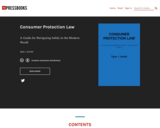
A Guide for Navigating Safely in the Modern World
Word Count: 20232
(Note: This resource's metadata has been created automatically by reformatting and/or combining the information that the author initially provided as part of a bulk import process.)
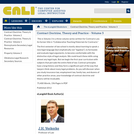
This is Volume 3 in a three volume series written for Contracts Law. Its former title is "Collaborative Teaching Materials for Contracts."
The first semester of law school is mostly about learning to speak a new legal language (but emphatically not “legalese”), to formulate and evaluate legal arguments, to become comfortable with the distinctive style of legal analysis. We could teach these skills using almost any legal topic. But we begin the first-year curriculum with subjects that pervade the entire field of law. Contract principles have a long history and they form a significant part of the way that lawyers think about many legal problems. As you will discover when you study insurance law, employment law, family law, and dozens of other practice areas, your knowledge of contract doctrine and theory will be invaluable.
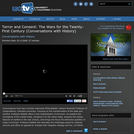
Conversations host Harry Kreisler welcomes Philip Bobbitt, Herbert Wechsler Professor of Jurisprudence, Columbia University. Focusing on the transformation of the state and warfare, Professor Bobbitt offers a new interpretation of terrorism. He explains the emergence of the market state, compares it to the nation state, analyzes the unique features of warfare in the new century, and brings into focus the distinctive qualities of today's terrorism. Professor Bobbitt also describes the challenges posed for national security and offers an agenda for changes that integrate strategy and law. (57 minutes)
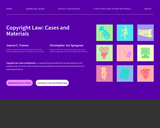
Copyright Law: Cases and Materials is a free copyright law textbook designed for a four-credit copyright course, which is what we teach at NYU School of Law. Model syllabi for four-credit and three-credit courses are available in the Faculty Resources section of this website. All faculty teaching copyright law are welcome to access the Faculty Resources, including the faculty discussion forum, by becoming a registered user of the site. To register, write us at jeanne.fromer@nyu.edu or christopher.sprigman@nyu.edu.
The textbook is made available under a Creative Commons Attribution-NonCommercial-NoDerivatives 4.0 International License. Under the terms of this license, you are free to copy and redistribute the textbook in part or whole in any format provided that (1) you do so only for non-commercial purposes, and (2) you comply with the attribution principles of the license (credit the authors, and link to the license). Note please that this license does not permit you to make modifications to the textbook or to create derivative works. That said, there are a wide variety of derivatives that we would gladly permit. If you want to make modifications to the textbook, please contact us.
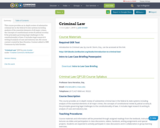
This course provides an in-depth review of substantive criminal law in the federal & state systems including analysis of the essential elements of all major crimes, the concepts of constitutional review & judicial scrutiny & the principles governing legal challenges to the constitutionality of laws. It includes legal research & writing & analysis of case and statutory law. All course content created by Sara Horatius. Content added to OER Commons by Julia Greider.
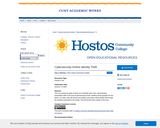
This is an activity the goals of which are to facilitate team work; critical thinking; presentation skills in the area of cybersecurity and law. Students will be grouped into two teams. As a team, they will choose and analyze cases about online identity theft through the questions presented in the activity. They will present their analysis to the class.

This course examines the role of the engineer as patent expert and as technical witness in court and patent interference and related proceedings. It discusses the rights and obligations of engineers in connection with educational institutions, government, and large and small businesses. It compares various manners of transplanting inventions into business operations, including development of New England and other U.S. electronics and biotechnology industries and their different types of institutions. The course also considers American systems of incentive to creativity apart from the patent laws in the atomic energy and space fields.
Acknowledgment
The instructors would like to thank Joanne Rines and Elijah Ercolino for their efforts in preparing this course.

Trata-se de comentários-aula à alternativa (A) da Q1331944 (que é como o site QConcursos.com.br organiza seu banco de questões de provas de concursos públicos e de Exame de Ordem da OAB do Brasil). Foram ultilizados elementos da Educação à Distância (EaD).
Alternativa (A) da Q1331944 comentada: "Considera-se empresário todo aquele que exerce atividade econômica organizada para a produção ou a circulação de bens ou de serviços." Ou seja, este material didático autoinstrucional (MDA) se enquadra na subdisciplina Teoria Geral do Direito Comercial (Empresarial), que se insere, por sua vez, agora, sim, na disciplina Direito Comercial (Empresarial).
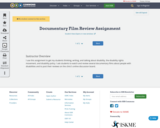
I use this assignment to get my students thinking, writing, and talking about disability, the disability rights movement, and disability policy. I ask students to watch and review several documentary films about people with disabilities and to post their reviews on the clinic's online discussion board.
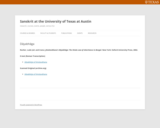
Rocher, Ludo (ed. and trans.) Jīmūtavāhana’s Dāyabhāga: The Hindu Law of Inheritance in Bengal. New York: Oxford University Press, 2002.
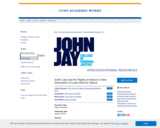
Earth Law and the Rights of Nature: A New Generation of Laws Built for Nature Wilson, Grant, Kayman, Lindsey, Bartlett, Paul, and Milena Popov John Jay College of Criminal Justice, Earth Law Center, Environmental Education Fund
Forget doom and gloom. Let’s educate students about the Rights of Nature, an inspiring, evolving legal development which is gaining traction in the US and around the world, and which can promote the cultural shift needed to address our overlapping intersecting environmental crises — climate change, accelerating species extinction, and ecosystem collapse. The Rights of Nature is one aspect of Earth Law. Some of the other specific movements falling under the banner of Earth law are nonhuman rights for animals, defining ecocide as a crime, rights of future generations, legal guardianship for nature, and Indigenous legalities. In most countries, Nature has the legal status of mere property. The Rights of Nature recognizes that humans and Nature are in a relationship, rather than Nature merely providing a hoard of natural resources for indiscriminate human use. The legal structures discussed in Rights of Nature literature codifies the details of this restored relationship, rather than actually creating it. Nature becomes a legal entity with basic rights: the right to exist, flourish, thrive and regenerate. The Rights of Nature can also complement Indigenous rights by empowering Indigenous peoples to serve as legal guardians of their traditional territories. This poster and a companion open access CUNY Commons webpage and repository will provide links to curated video clips, films, case studies, a course book, a graduate level course syllabus, mock trial workshops, and written materials that can be used for incorporating the Rights of Nature and complimentary legal movements concepts into curricula.